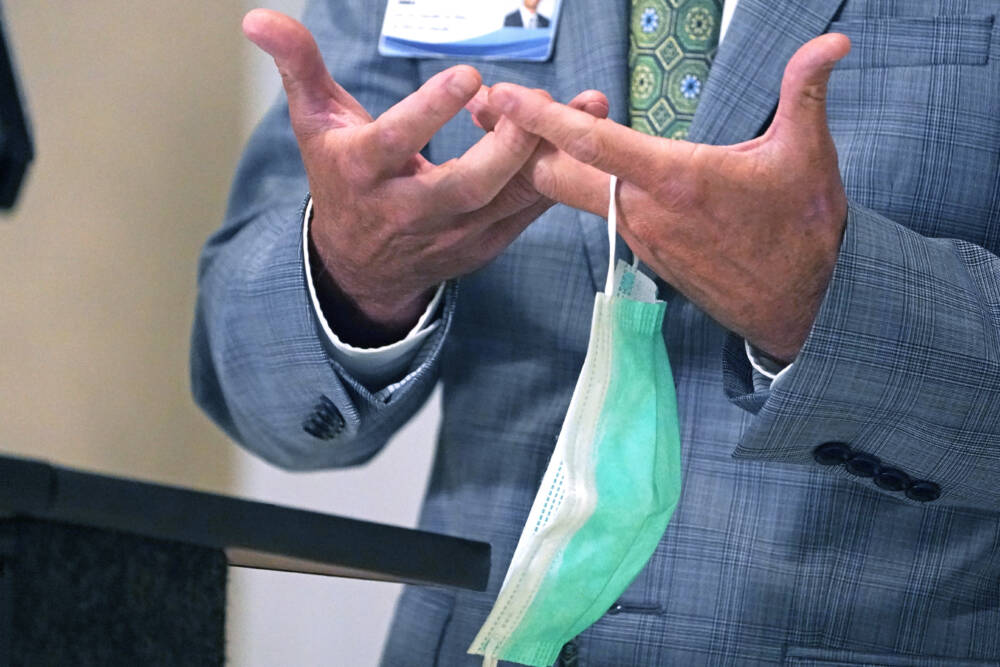Advertisement
Boston's Morning Newsletter
From masks to Title 42, a quick list of the COVID policies changing today

Editor's Note: This is an excerpt from WBUR's daily morning newsletter, WBUR Today. If you like what you read and want it in your inbox, sign up here.
A lot of things began changing early this morning when the clock struck 12:01 a.m. At both the federal and state level in Massachusetts, the COVID public health emergencies expire today. And they’re not just government declarations on a piece of paper; as WBUR’s Priyanka Dayal McCluskey reports, the expirations come with a slate of policy changes with immediately visible, real-world implications.
Here’s a quick summary:
Masks: You’ll no longer be required to wear a mask at your next hospital visit or dentist appointment, due to the end of the face covering mandate for health care settings. Hospitals are free to require masks, but most systems plan to relax their policies.
- One new mask rule: health care facilities must stock masks that patients, visitors and staff can access if they want.
Vaccination mandates: State government employees will no longer be required to be vaccinated against COVID. Boston is also dropping its vaccination mandate for city workers. (The White House’s vaccine mandate for federal workers is being lifted, too.)
Tests: Massachusetts’ biggest health insurers will stop covering free at-home COVID tests — meaning you’ll pay out of pocket (about $24 per two-pack) unless your doctor orders them.
Tracking: The CDC will stop regularly reporting on national COVID cases, shifting its focus to hospitalization data. For now, Massachusetts isn’t making any changes to its weekly reporting of COVID cases and testing. But the state’s new public health commissioner, Dr. Robbie Goldstein, told reporters this week that he expects there will be changes in the coming weeks and months.
What stays the same: You should still be able to get the COVID vaccine for free through your insurance, due to Affordable Care Act rules. And even if you don’t have insurance, vaccines and treatments like Paxlovid should remain free through at least 2024.
- Doctors will also still be allowed to prescribe controlled substances using telehealth — at least until November.
Now what? Goldstein’s recommendation for the average person — “what I tell my mom” — is to stay up to date on your COVID vaccine. For older and immunocompromised adults, that may mean it’s time for your second (if not first) bivalent booster shot.
What if … ? Goldstein expects the virus that causes COVID-19 to remain with us “for some time,” changing and mutating — and public health leaders say they’re ready to respond if rates rebound from their current low levels. For example, hospitals need a plan for when to reinstate mask mandates if there’s a spike. “We have learned a tremendous amount, and we’re going to continue to apply those lessons to all public health emergencies,” he said.
Another pandemic-related policy that ends today: Title 42. The Trump-era policy allowed immigration officials to quickly expel and deny entry to asylum-seekers at the border on public health grounds.
- While asylum-seekers still face tough restrictions, NPR reports that basically everyone at the border expects an influx of migrants in the wake of Title 42’s expiration.
- Mayor Michelle Wu’s office is calling on the federal government to provide more work permits to asylum-seekers and more funding for community-centered support services. “We will continue to monitor the situation and are ready to be a strong partner to the state as it leads on this crisis,” a city spokesperson said.
- Zoom out: Massachusetts saw more than 2,000 migrants arrive last summer, primarily from Haiti and South America.
School buses are back on the streets in Marlborough this morning. After a three-day strike that forced parents to scramble this week, drivers have agreed to a new contract with the city’s bus company.
Somerville is relaunching a program offering some residents free taxi rides to grocery stores, food pantries and medical appointments.
- The program will send residents with limited income 12 vouchers — usable through Oct. 31, 2024 — up to every three months.
- Live in Somerville? See if you’re eligible here.
Calling all aspiring guinea pig owners: The MSPCA and Northeast Animal Shelter are waiving adoption fees for guinea pigs today through Sunday, after recently taking in 45 pet rodents from a Suffolk County home. (According to the MSPCA, the owners thought all their guinea pigs were the same sex, and then, well … babies!)
- With their own cages now filling up, the animal rescue groups are offering fee-free guinea pigs (a savings of $30) at their branches in Boston, Methuen, Centerville and Salem. Learn more here.
P.S.— Where can you catch WBUR newsroom staff on a sunny day? Amid this stretch of summer-like weather, we asked our team to share their favorite patio dining options in Boston for our most recent edition of our Weekender newsletter. Help us add to the list by sharing your favorites, too. Just reply to this email with your top recs!
